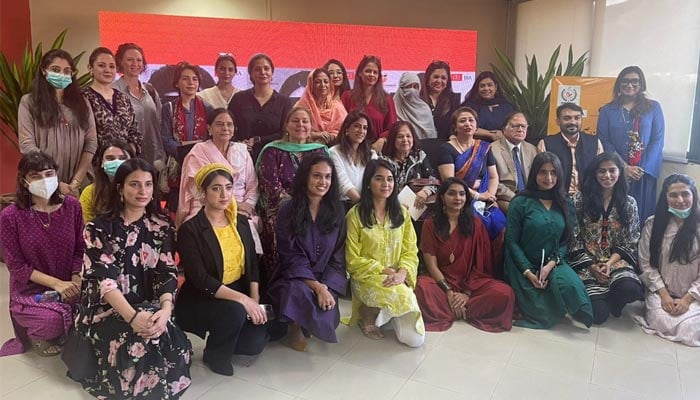NCHR launches complaint cell for women journalists
Women journalists often face the brunt of harassment and abuse, particularly within online spaces
ISLAMABAD: The National Commission for Human Rights (NCHR) on Friday launched a complaint cell for women journalists.
The cell has been established at the NCHR in collaboration with the Digital Rights Foundation (DRF) and the Centre for Excellence in Journalism (CEJ).
The launch took place following a consultative meeting held with Pakistani women journalists from across the country.
NCHR’s Chairperson Rabiya Javeri Agha announced the launch of the complaint cell which will be dedicated to resolving human rights issues that arise from the targeting of women journalists, to ensure the freedom of the press.
“Freedom of the press and freedom of the media are cornerstones for any functioning, successful democracy,” she said, after announcing the launch of the complaint cell.
During the meeting, female journalists shared their concerns and discusses challenges they encounter on a daily basis.
In her keynote speech at the event, NCHR’s Rabiya Javeri spoke about online violence and harassment, deeming it as one of the “biggest challenges in online spaces” and lamented how women journalists report on critical issues face increased risks of attack and censorship.
DRF’s Nighat Dad also reiterated her view stating that online spaces are increasingly becoming hostile for women journalists and women in general. Dad also pointed toward the ways in which online freedom of expression has been negatively impacted including legal restrictions, extra-judicial excesses, online violence and harassment, monitoring, and gendered disinformation against women journalists.
Speaking about the impact of online abuse, CEJ’s Director and journalist Amber Rahim Shamsi stated that women journalists face harassment, physical insecurity, the gender wage gap, and mental distress as a result.
While the Constitution of Pakistan provides safeguards for online speech in the form of Article 19 for free expression and Article 19(A) for the right to information, these freedoms have increasingly come under attack. Pakistan has consistently ranked low on indices rating freedom of expression, and online spaces are no different.
According to the Reporters Without Borders World Press Freedom Index 2021 Pakistan ranks 145 out of 180 with constant regulations and censorship of the media. Laws such as sedition and defamation, particularly criminal defamation, have been used to pursue cases against journalists.
The Prevention of Electronic Crimes Act 2016 (PECA), particularly section 20, is frequently used to initiate proceedings against activists for critiquing state institutions.
-
Security forces gun down 30 terrorists in multiple IBOs in KP: ISPR
-
MQM-P calls for new province in Sindh
-
US report validates Pakistan military edge over India: PM
-
Banned TTP poses serious threat to Pakistan security: UNSC panel
-
CM Afridi clarifies remarks on by-poll after ECP requests army deployment
-
Dubai sees 3.2m Pakistani passengers in 2025 as airport sets new milestone
-
Security forces kill 23 Indian proxy terrorists in KP's Kurram
-
Pakistan to construct island to boost oil exploration: report












